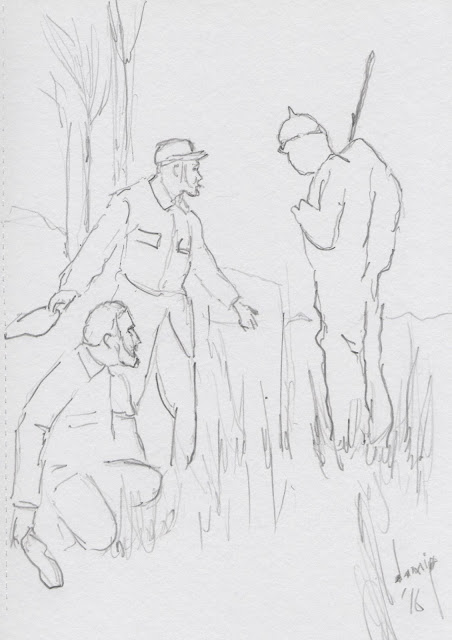Impression sketch
of RMS Alcantara engaging the German
raider Grief, 29 February 1916 - by
Jamie. From an original image that can be seen at: <https://commons.wikimedia.org/wiki/File:Alcantara_1916.jpg>
[Accessed: 29 February 2016]
i
In construction for the Royal
Mail
Steam Packet Company, Alcantara
Began her voyages by 1913 - one
Of the final 'A' series of ships
Powered by three propellers.
An Ocean Liner for peaceful
voyages,
To sail from Southampton down
To Buenos Aires over the waters,
Was a German commissioned steel
Hulled cargo steamship, Guben.
Built for the German Australian
Line -
Matters changed when Guben
Became SMS Greif - converted
For navel service; given torpedoes,
Four 15 cm and 10.5 rapid guns.
Not so far behind, RMS Alcantara
Was requisitioned as an armed
Merchant cruiser - provided depth
Charges, anti aircraft gunnery,
With six 6-in guns - RMS was
ready.
As part of the northern sea
patrol,
Alcantara's mission was to halt
Any German access about North
Atlantic - activity about
Russia's
Archangelsk sent her to
investigate.
With belief of a German submarine
Base situated in the Arctic
Ocean,
Alcantara arrived at volcanic isle
Of Jan Mayen - a party found only
Remains of a North Pole
expedition.
An abandoned base of 1882, where
Arctic fox cubs roamed, to be
kept
Briefly as Alcantara
pets - by 1916
The cruiser left for their
squadrons
10th patrol to return on 1st
March.
The fully kitted SMS Greif begun
Her tour to sail 27 February,
under
Guise of flying a Norwegian flag
-
Sailing with concealed armaments,
Her role to be a commercial raider.
ii
The assigned route of Greif was
to sail
Into the Atlantic from Iceland’s
north,
To aim for German East Africa -
should
Need arise - calmly steaming a
course,
Greif maintained appearance of
Rena.
On one day that exists only every
four
Years, Alcantara set to meet Andes -
Sailing close to Shetland to be
notified
To halt - should a suspicious ship
make
An appearance. A look out made a
check.
At a distance the Andes had seen
smoke
Of a two funneled boat, whose
identity
Was in doubt - the Alcantara
look out
Felt the boat authentic - yet to make check,
A cutter lowered, as the boat
received a note.
The Andes had signaled Captain
Wardle,
Who advised this was the suspicious
boat.
Then the Rena revealed self as
Greif -
Revealing their full gunnery, they fired down
On boarding cutter, then at
the boat's bridge.
Alcantara's steering gear was hit - Captain
Waddle ordered return fire - with emergency
Gear in place, the exchange of
close
Quarters continued, as the Greif
turned
Starboard to aim for the Alcantara's
waterline.
From only 2000 to 750 yard enemy
shells cut
Into the engine room - Greif
attempted
Torpedoes, yet evasive moves
supposedly
Avoided these, when a hit struck
at her
Portside - Alcantara's
6-inch gun fired back.
Ammunitions of Greif's aft gun was
struck,
Put out of action by 10.15 a.m. -
the ships
Bridge was on fire to halt at 10.22 a.m. -
Boats began to leave, as Alcantara
ceased
Fire - Still the encounter was not
quite over.
At 3 knots without any working
steering
Gear, Alcantara at
10.35 a.m. became
Jammed turning starboard -
a flooded
Engine room did not receive message
to
Halt - all then seemed lost for Alcantara.
Within 30 minutes tilting on her
beam end,
The abandoned Alfantara
went down -
The Andes and Munster had then
arrived.
Greif was still afloat, when a
final shot
Discharged by a raging fire made
final show.
With assistance of Comus and the
Andes,
The Greif went down in a final
explosion -
To lose 230 crew - as rescue
manoeuvres
In reaching lifeboats was delayed, by
idea
Of a submarine - but rescues went ahead.
by Jamie Mann.
Source: File: Action
of 29 February 1916. Wikipedia. Online. Available at: <https://en.wikipedia.org/wiki/Action_of_29_February_1916>
Accessed
29
February 2016
Source: File: RMS
Alcantara (1913). Wikipedia. Online. Available at: <https://en.wikipedia.org/wiki/RMS_Alcantara_%281913%29>
Accessed 29 February 2016
Source: File: SMS
Greif (1914). Wikipedia. Online. Available at: <https://en.wikipedia.org/wiki/RMS_Alcantara_%281913%29>
Accessed 29 February 2016
#WW1 #WW1centenary #GreatWar #WW1poem #GreatWar #WW1centenary
#worldwarone #worldwaroneremembered #WW1Navy




